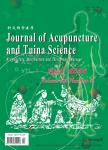Tuina for primary insomnia: a meta-analysis
推拿治疗原发性失眠的Meta分析作者机构:Hunan University of Chinese MedicineChangsha 410208China The First Hospital of Hunan University of Chinese MedicineChangsha 410021China Institute of Basic MedicineChina Academy of Chinese Medical SciencesBeijing 100700China
出 版 物:《Journal of Acupuncture and Tuina Science》 (针灸推拿医学(英文版))
年 卷 期:2018年第16卷第4期
页 面:236-242页
核心收录:
学科分类:1005[医学-中医学] 100512[医学-针灸推拿学] 10[医学]
基 金:supported by Hunan Provincial Innovation Foundation for Postgraduate
主 题:Tuina Massage Insomnia Acupoint Head Pittsburgh Sleep Quality Index Randomized Controlled Trial Systematic Review Meta-analysis
摘 要:Objective: To systematically evaluate the therapeutic efficacy of tuina therapy for primary insomnia. Methods: Nine Chinese and English databases were searched from the inception to May 2017 to identify randomized controlled trials (RCTs) studying tuina therapy for insomnia. The enrolled articles were all RCTs with tuina as the monotherapy or major therapy in the experiment group, with clear diagnostic criteria for primary insomnia well recognized worldwide or in China, and Pittsburgh sleep quality index (PSQI) as one of the outcome measures. Two researchers evaluated the risk of bias and quality of the enrolled studies by following Cochrane Handbook version 5.1.0. The meta-analysis was performed by RevMan version 5.3. Results: Eleven studies were included with a total of I 076 participants. The Western medication adopted in the control groups were benzodiazepine receptor agonists. The studies were all assessed as high risk of bias for blinding since blinding method was unable to be performed due to the specificity of tuina therapy; no study reported the support of fund or potential interest conflict, so they were all rated unclear for selective reporting. The meta-analysis showed that compared with other traditional Chinese medicine therapies, tuina worked more effectively in reducing the PSQI score (MD=-4.11〈O, 95% confidence interval (CI) -6.01 to -2.22, P〈0.O001); compared with oral administration of Western medication, tuina showed more significant efficacy in reducing the PSQI score (MD=-3.42〈0, 95%CI -5.19 to -1.66, P〈0.O001). Subgroup analysis showed that head tuina alone showed no significant difference compared with oral administration of Western medication regarding the change of PSQI score (MD=-4.19〈O, 95%CI -8.87 to 0.50, P〉0.05); a combination of head and back tuina could more effectively reduce the PSOJ score compared with oral administration of Western medication (MD=-2.08〈O, 95%CI -3.09 to -1.06, P〈0.O001). Conclusion: Tuina can produce more signifi



